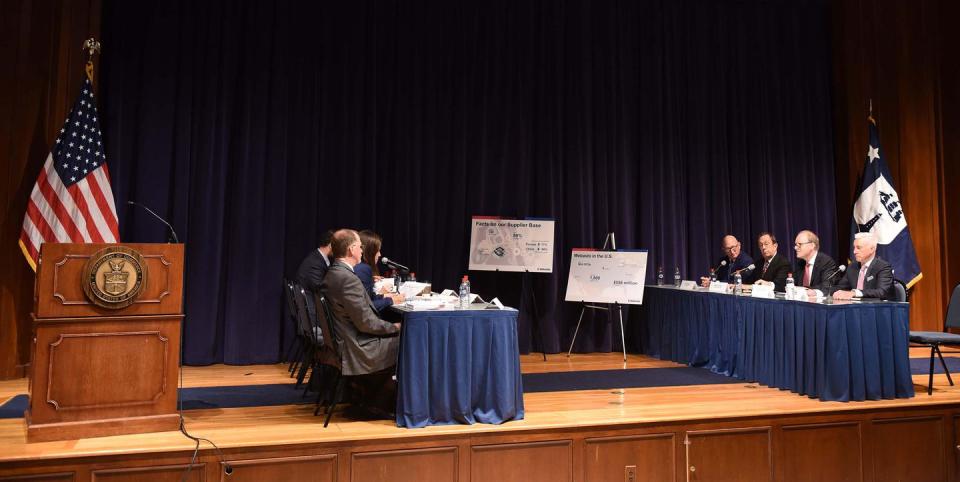Auto Industry Reps Pan Trump Tariffs at Hearing

During a full day of testimony by representatives from the auto industry and several foreign governments, the United Auto Workers union stood alone in its support of a proposal by the U.S. Department of Commerce to investigate national-security threats posed by imported automobiles and parts. In practice-and what has been promised by President Donald Trump and his administration-that investigation could result in protective tariffs of up to 25 percent on those imports, even units crossing regional borders from traditionally close trade partners such as Canada and Mexico.
Scores of organizations including the Auto Alliance, the National Automobile Dealers Association (NADA), the Specialty Equipment Market Association (SEMA), LG Electronics, Hyundai Motor, and Volkswagen Group of America had essentially the same message for department officials: Tariffs would hurt business, damage trade relationships, and undermine U.S. national security. Many of the same group had previously made similar assertions in public statements filed last month.
"There is simply no evidence that the U.S. auto and auto parts sectors face an imminent crisis so profound as to imperil their continued existence and ability to supply vehicles and parts to the U.S. military," Erik Autor, president of the National Association of Foreign Trade Zones, said at the hearing, adding that current data shows the domestic auto industry to be healthy and strong. "Nor does this country face an imminent national-security threat, including the risk of a trade embargo, requiring that U.S. demand for autos and parts be filled entirely by domestic production to the exclusion of imports."
The Trump administration has pegged its protective tariffs on the national-security facet of the Trade Expansion Act of 1962, a law that when passed included a presidential tariff-cutting provision that had expired 51 years ago. Tariffs on steel and aluminum that also affected the auto industry went into effect in June.
Other points raised during testimony focused on increased costs for both foreign and domestic automakers as well as retaliatory tariffs by countries affected by U.S. tariffs. Higher materials costs, said various commenters, would leave less money for U.S.-based research and development, something manufacturers such as LG Electronics and Hyundai voiced a need for as battery and autonomous-vehicle technologies become more prominent. Reprisal tariffs and higher prices, commenters said, would lead to an international cordoning off of American products and reduced global competitiveness among U.S.-based businesses.
Joseph Boyle, senior director of business and development for LG, the Korean company that makes the battery packs for the Chevrolet Volt and other vehicles, said that, until now, the United States had been attractive to foreign investors because of its open markets and the stability of its policies. "Trade restrictions impose doubts that cause companies to look elsewhere," he said.
Representatives from Canada and Mexico expressed dismay at the prospect of a functioning North American auto-production system collapsing under the weight of perceived threats to national security and U.S. production. David O'Sullivan, the European Union's ambassador to the United States, called the proposed tariffs "patently absurd" and all but promised reprisals from the EU should they go into effect.
Automaker Groups Fight Trump Tariffs: “America Does Not Go to War in a Ford Fiesta”
Trump Administration Tariffs Could Boost Car Prices, Limit Choices
Here’s How Much the Major Automakers Spend on Government Lobbying
"The Peterson Institute has determined that if the U.S moves forward with the auto tariffs, 195,000 American jobs will be lost," Kirsten Hillman, Canada's deputy ambassador to the U.S., said at the hearing. "So where is the nexus between auto imports and U.S. national security? There is none."
('You Might Also Like',)

 Yahoo Finance
Yahoo Finance